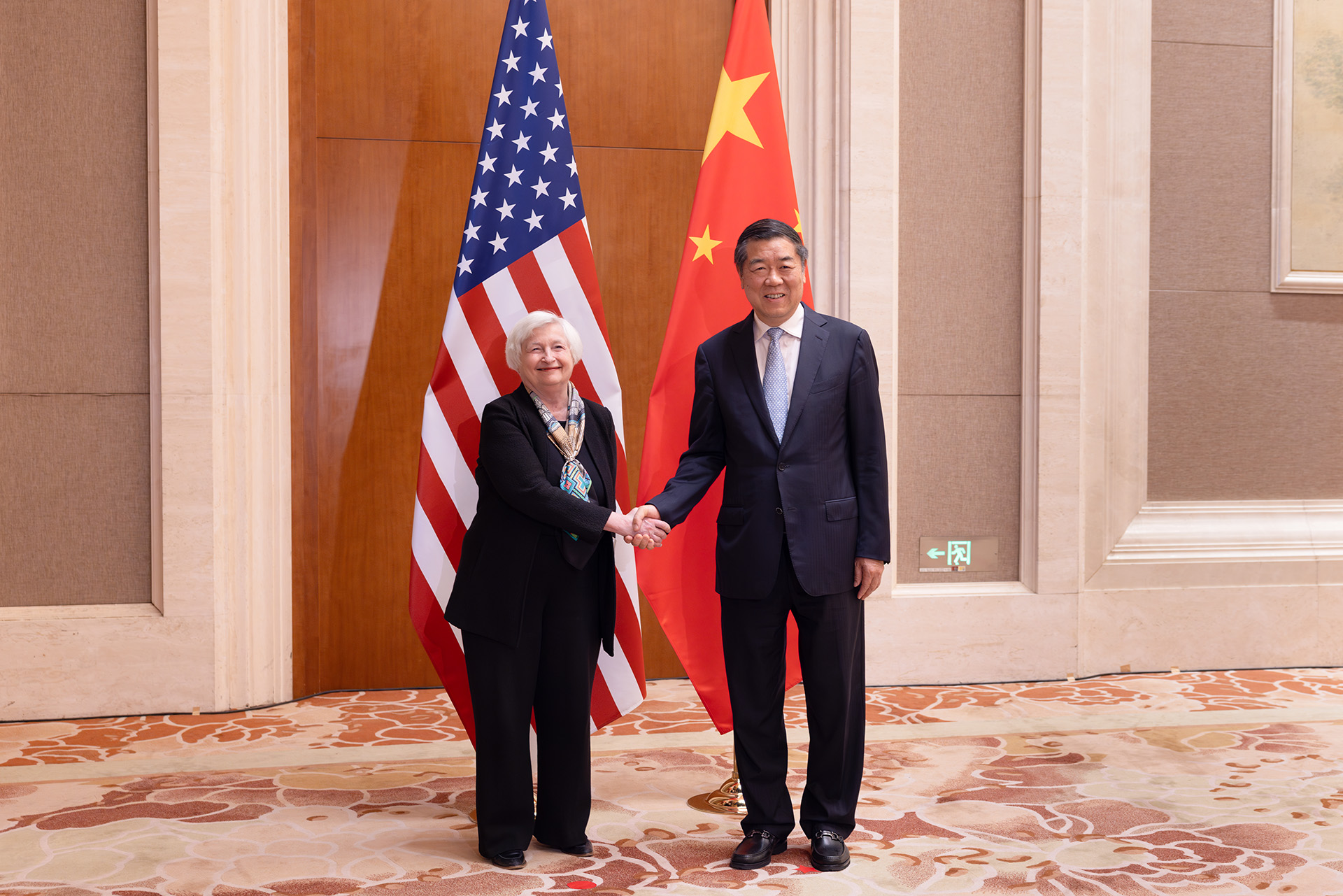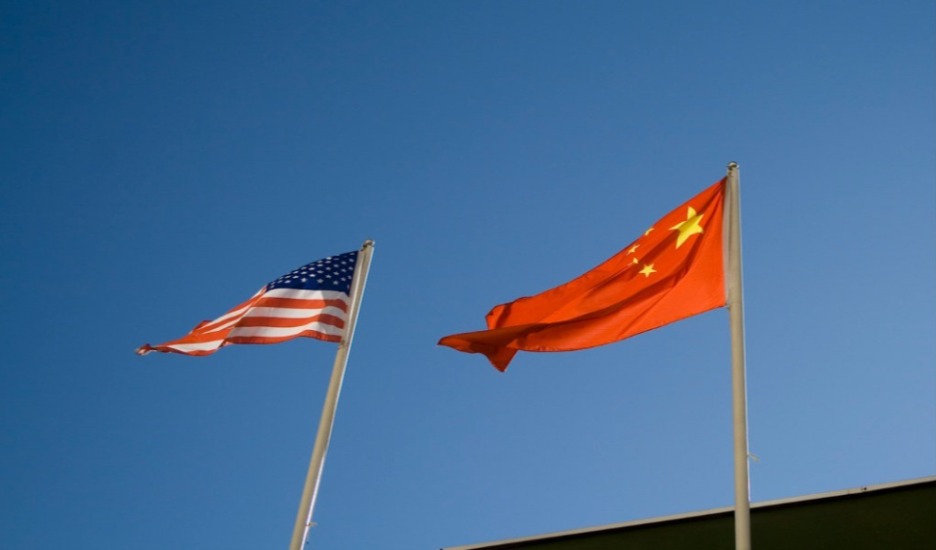How Economic Talks With China Can Advance U.S. Interests
Engagement is not a dirty word.

Published by The Lawfare Institute
in Cooperation With

In April, Secretary of State Antony Blinken and Secretary of the Treasury Janet Yellen traveled to Beijing with little fanfare. The Biden administration has kept diplomatic engagements and new working groups with Beijing relatively low-key; and their format and future, come the U.S. presidential elections this fall, is highly uncertain. Many in Washington are rightly skeptical that talking to Beijing can bring upsides for the United States. For decades, successive U.S. administrations tried to coax China toward market-oriented reform and responsible international behavior through high-level diplomacy and deepened trade and investment. Instead, Beijing embraced a statist, security-driven approach to governance, grew more assertive globally, and began weaponizing commerce for its strategic and military advancement.
Policymakers from both parties likely now see economic interdependence in many areas as more of a security liability than a long-term security investment. Regardless of who wins the presidency in 2024, Washington will be looking for ways to shore up American resilience, shorten sensitive supply chains, and secure U.S. leadership in strategic assets critical to economic growth in the decades ahead. It would be easy to discard talks with Beijing as part of this more competitive economic approach. But while “engagement” to change China’s behavior has run its course, high-level economic talks with Beijing—if designed strategically—can help Washington improve the effectiveness of strategic decoupling from China, maximizing security benefits and minimizing diplomatic and commercial liabilities.
A New Approach
High-level diplomacy should no longer aim to change China’s behavior. Chinese policy statements, state media reporting, and expert Chinese scholarship make clear there is limited room for negotiation with Beijing over its problematic policy measures—from import substitution, protectionist security regulations, and other non-tariff barriers to trade. Such moves are rooted in deep-seated beliefs, held in Beijing, that Washington seeks to curb China’s economic development and is unilaterally souring allied and partner countries on China. Lu Feng, director of the China Macroeconomic Research Center at Peking University, captures this sentiment: “Decoupling is not good for anyone, and this is our starting point. But if the other side forcefully decouples from us, we must fight back. … The more China backs down, the more blows it will receive.”
Beijing’s readiness to negotiate such policies is low, especially since Chinese analysts (accurately) assess that Washington is “re-engaging” without the intent to broadly deepen economic ties. “Whereas the past ‘engagement’ was based on the positive expansion of cooperation between the two countries, the current ‘re-engagement’ [by the U.S.] focuses more on the recalibration of the relationship between the two countries,” writes a Tsinghua University scholar. In Beijing’s view, this makes Washington a different type of negotiating partner: one uninterested in offering concessions on matters of substance.
The net effect is that Beijing is approaching these revamped economic talks with Washington the same way it did the later sessions of the long-running Strategic and Economic Dialogue and Joint Commission on Commerce and Trade platforms: unready and unwilling to faithfully negotiate or explore a course-reversal on its discriminatory trade practices or growing set of security regulations. Instead, Beijing sees clarity on U.S. policy measures as a key value proposition of talks with Washington. In most bilateral economic exchanges over the past two years, Beijing has criticized American trade and investment restrictions as part of its messaging to domestic audiences, but also sought to maximize visibility into U.S. policy plans. Chinese policymakers eagerly pushed for a working group on export controls during Secretary of Commerce Gina Raimondo’s trip to Beijing in August last year.
Understanding how China approaches engagement with the United States helps distill what can realistically be achieved and how Washington can tailor its approach to derive asymmetric advantages. A four-pronged approach will be most effective in advancing U.S. interests. First, Washington can probe Beijing’s plans to address the deep and numerous challenges facing its economy in the coming years, to preempt risks and optimize strategies to protect U.S. workers and firms. Second, Washington should regularly telegraph and explain U.S. trade and technology restrictions to Beijing, aiming to limit the scale and scope of retaliation even while advancing these restrictions to reflect evolving risk perceptions. Third, Washington can work to sustain regular bilateral engagement with Beijing as a strategic reassurance mechanism to allies and partners that maximizes the space for coordinated action on China. And fourth, Washington should press Beijing for cooperation on global economic challenges, such as developing world debt, to reaffirm U.S. leadership on issues critical to the Global South.
Intelligence Gathering
Through bilateral economic talks, Washington can gain visibility into an increasingly opaque strategic adversary and close critical information gaps around Chinese economic policy direction and measures in the years ahead.
Beijing faces tough challenges in managing its economy for the foreseeable future. The country’s decades-long investment-led growth has largely run its course, while serious structural challenges, from demographics to debt, will inevitably pressure a transition to greater domestic consumption. So far, Beijing appears unwilling to engender consumption-led growth through measures such as consumer stimulus. Challenges in the property sector, which captures more than 60 percent of household wealth, compound a broader crisis of confidence among both consumers and private businesses. Urbanization and rapid population aging promise financial strains for highly indebted local governments well into the future.
How Beijing tackles these and other challenges will impact the American (and global) economy. Bilateral trade sat at $575 billion in 2023. China represents 18 percent of global GDP and 30 percent of global manufacturing. This means its economic policy choices have consequences beyond its borders. Beijing’s push to manufacture and export its way out of current economic weakness, for example, risks overcapacity across a range of sectors central to economic prosperity in many advanced economies.
Yet even as China’s economy has become more consequential, it has become more opaque. Decision-making is increasingly top-down and less predictable to external observers. An attendant challenge is that Chinese regulators are often less consistent in releasing basic economic data, and firms reporting such information have faced crackdowns. The result is that Beijing is grappling with increasingly serious challenges in increasingly nontransparent ways. Foreign investors and governments revert to parsing President Xi Jinping’s speeches and other party publications for signals of future measures on issues from industrial policy to macroeconomic planning.
U.S. policymakers will be best positioned to preempt and respond to Chinese practices that harm American firms and workers with maximum visibility into such practices. Washington must therefore use every tool in its toolkit to probe Beijing’s plans to address known, and unforeseen, economic challenges over the years ahead, and the internal and external dynamics shaping policymaking. Economic talks offer one such tool, enabling Washington to directly observe and listen to a strategic adversary. How much Chinese interlocutors will engage in genuine policy transparency or revert to talking points remains to be seen, but U.S. policymakers should try to move the needle by stressing the risks that policy opacity poses to Beijing’s long-term economic well-being. Blurred commercial and military end uses in China, for example, challenge any effort to keep technology controls narrow and minimize secondary effects on the Chinese economy.
Insulation
Washington can use direct economic talks with Beijing to telegraph and explain its de-risking agendas, endeavoring to shape Beijing’s response and pave the way for more U.S. trade and technology restrictions, rather than fewer.
Beijing has tested retaliatory waters in response to recent de-risking efforts in Washington and other capitals. In February 2023, Chinese authorities added two U.S. defense contractors, Lockheed Martin and Raytheon, to China’s “Unreliable Entity List” for arms sales to Taiwan. In June, China’s Ministry of Commerce announced controls on the export of two rare metals—germanium and gallium—for national security reasons, a move widely interpreted as punishment for U.S. and allied chip controls given use of the materials in semiconductors. At the time, a former Chinese vice minister of commerce described the export controls as “just the beginning of China’s countermeasures.”
Yet recent experiments in transparency, through working groups and high-level diplomacy, show its power in shaping Beijing’s reaction to trade and technology measures—at least at the margins. After unveiling outbound investment restrictions on China in key areas including artificial intelligence (AI), quantum, and semiconductors last August, senior administration officials took care to explain to Chinese counterparts the efforts that had gone into tailoring the order. Beijing was miffed, but close observers suggest the notification helped mute its potential response. Conversations with People’s Bank of China Governor Pan Gongsheng likewise helped diffuse another potential flashpoint when Washington resisted International Monetary Fund reforms that would have given China more power in the international financial body. Explaining U.S. economic restrictions may shape how China chooses to respond.
Washington should continue to leverage economic talks toward this end. This will include presenting U.S. perspectives on where China itself is de-risking, how U.S. actions are rooted in Beijing’s behavior (such as military-civil fusion policies and military modernization), and where concerns are shared by other capitals. To the extent that it insulates the United States from some of the potential pain points attendant with de-risking, direct engagement can pave the way for a more robust competitive agenda toward China.
Coalition Building
Washington can also meet regularly with Beijing to reassure key allies and partners about rising bilateral tensions and to maximize the chance for coordinated trade and technology action on China.
Many in Washington have criticized recent high-level engagement by the Biden administration for favoring process over outcomes. But process itself can bring outsized victories for the United States, as a way to demonstrate that Washington is managing competition with China responsibly. This may not be an end in itself but is a means to a more important end: maximizing the effectiveness of strategic decoupling.
America’s closest allies and partners will play a critical role in determining whether U.S. actions achieve their ends, including robust national security protection, slowing China’s military advancement, and improving domestic resilience. Strong measures to curb Chinese access to key assets, from export controls to investment screening, will be far from leak-proof if they remain unilateral, given the globalized nature of today’s supply chains. Had Japan and the Netherlands begun filling gaps left by American suppliers, for example, Washington’s Oct. 7, 2022, chip controls could have backfired “disastrously”—failing to meaningfully slow China’s military technology development and creating stronger international competitors to American technology leadership. Having these allies on board ensured that bold U.S. efforts to cut China off from advanced semiconductor manufacturing equipment packed a punch and did not disproportionately disadvantage American firms.
As Washington looks set to grow the yard of protected strategic goods in the years ahead (and strengthen protective fences), it must encourage allies and partners to follow suit and understand where its own actions deter such coordination. These capitals are individually rethinking their approaches to economic interdependence, including with China—as is clear from the G7 Leaders’ Statement on Economic Resilience and Economic Security, Germany’s China strategy, and the EU’s economic security strategy. Yet excessively confrontational rhetoric and framings from Washington, or uncertainties about U.S. policy direction, may inadvertently slow the pace and scope of follow-through from these capitals. Last March, European Commission President Ursula von der Leyen deployed the term “de-risking” to distinguish EU efforts from a broader decoupling.
Economic talks with Beijing, and high-level diplomatic engagement more broadly, can play a small but important signaling role in this regard, reassuring allies and partners about baseline stability in the relationship. In the same way that over-militarizing the China challenge and eschewing dialogue with Beijing altogether risks hedging and paralysis among allied and partner capitals nervous about the future risk of conflict, pursuing regular dialogue with Beijing will carve out political space for these capitals to press ahead with their own de-risking measures. This does not mean Washington should hold back on candid vocalization of the ways China is hurting U.S. interests or slowing efforts to curb its access to U.S. technology, but rather it should do everything possible to make these moves maximally effective. Forgoing economic talks with Beijing, which cost the United States little but improve its positioning in strategic competition with China, would be a missed opportunity.
Reaffirming U.S. Leadership on Global Issues
It will be vital for U.S. leaders to raise global challenges in dialogue with Chinese counterparts.
Beijing’s incentives are undoubtedly mixed when it comes to joint action on transnational challenges in the economic domain or otherwise, having invested considerable diplomatic capital framing itself as a provider of economic and developmental solutions for the Global South and a defender of the open global economy while Washington unilaterally closes its doors. While Washington should have limited expectations that Beijing will prove a good-faith partner here, that is not the point.
Boldly inviting China to cooperate on global economic challenges, such as developing world debt and climate financing, will ensure Washington acts as an agenda-setter on issues of central importance to the increasingly powerful and populous Global South. Washington must recognize that many emerging economies in Africa, Asia, the Middle East, and Latin America are concerned about what intensifying U.S.-China competition and a broad retreat from globalization means for their development trajectories. In certain regions, China has been effective at propagating a narrative that Washington is the chief contributor to escalating geopolitical tensions. Pushing back on this narrative lies firmly within America’s self-interest, and proactively raising global economic challenges in bilateral forums with China offers one among a variety of vehicles toward this end.
Maximizing the Toolkit
Even while firmly rejecting strategic engagement as a relic of more optimistic days in the relationship, the next U.S. administration should not underestimate the power of economic talks with Beijing to help maximize the security benefits of strategic decoupling while limiting its commercial and diplomatic downsides. Direct talks with Beijing on economic matters can help advance objectives Donald Trump and Joe Biden share, including shoring up domestic resilience, effectively protecting U.S. national security, and combating Beijing’s efforts to pare back U.S. global influence. Such talks will not put the scope, speed, or substance of competitive U.S. measures up for discussion, as much as Beijing would like Washington to reverse course. Instead, high-level diplomacy should focus on two-way information provision that can help Washington craft forward-looking policies effectively advancing American prosperity and security—and bring key partners on board.


.jpg?sfvrsn=5a43131e_9)


